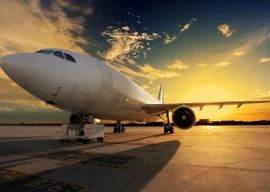
Muhammad Nadim, a frequent business traveller on Pakistan International Airlines, recalls the days when he actually looked forward to flying on the national carrier. “The food was good, the service on domestic flights was average. The biggest advantage was reliability. PIA was usually on time and when there was a delay, a replacement aircraft would soon be arranged. This gave it an edge over the smaller private airlines who did not have the required aircraft to do this.” The famous PIA line “Great People To Fly With,” seems now to be changing.
If 2011 is any indicator of the airline’s performance, that edge is now a thing of the past. Flight delays are common, as employees accuse the management of creating a crisis like situation so both planes and services can be leased from outside the company.
December 12 was a dark day in the history of PIA. Nineteen of its 39 aircraft are believed to have been grounded for technical reasons at Karachi Airport, on-ground engineers told The Express Tribune. When contacted, PIA spokesman Sultan Hasan contradicted the number and said that only “three or four planes” were grounded at the Ispahani Hanger in Karachi “for routine check-up.” But if the check-ups were routine, what could not be explained were the series of delays and flight cancellations in November-December. These flight disruptions left hundreds stranded at different airports around the country and abroad.
The extent of the problem still remains unclear. Tahir Khaliq, an adviser to the PIA chief, put the number of grounded planes at 11. According to him, PIA has five Jumbo planes which are not used for normal flights since they consume 12% more fuel. While two of these are currently under maintenance, he said, the remaining three are mostly used for chartered flights.
Out of 12 Airbus aircraft, Khaliq said, nine are operational while three are grounded by the Civil Aviation Authority. He did not give details. Of the six Boeing 737 aircraft, he said two are grounded and one of seven ATRs is also not flying. All nine Boeing 777 planes are functioning, he said.
The availability of spare parts seems to be the main culprit. Despite having a world class engineering facility, PIA depends on an outside supplier for parts. And this arrangement has its critics. As happened on December 12, twelve engines were to be installed but since no new engines were available, the carrier had to resort to swapping parts from one aircraft to another to sustain its flight operations.
Furthermore, despite a credit line worth $700 million under a contract with the Dubai-based company Transworld Aviation, seven to eight aircraft have been standing idle, waiting for spares or repairs at the engineering department.
Sultan Hassan clarifies that Transworld always provides spare parts in time but in case of a delay, PIA purchases required equipment from the open market and the company reimburses the amount PIA spends. “We need spares of around $40 million annually for our entire fleet,” he informed.
But it is not an ideal arrangement. Using replacement engines and spare parts has caused several flight malfunctions. In one incident on August 19, the spare parts of an Airbus were fitted into another PIA aircraft that had stopped at the Paris airport for a routine check-up. Passengers had to be evacuated after a fuel leak was detected. On another occasion, passengers on a flight from Milan via Paris were offloaded after aviation inspectors detected snags in the plane.
“It is common practice to fit one plane’s spare parts into another. If one plane is grounded and another requires a spare part or even an engine, engineers will definitely swap their parts,” Sultan Hassan clarified.
Suhail Baluch, president of the powerful Pakistan Airline Pilots Association (Palpa), says replaced spare parts can cause technical problems so severe that it can even result in emergency landings. Baluch claimed that PIA is short of 13 engines, which is why numerous planes are grounded. “Sixteen engines were sent for an overhaul as they had completed their life cycles. Four are ready for collection in Jordan.”
A joint action committee of employees claimed this week that PIA flights were still facing difficulties maintaining punctuality as deliberate shortage of aircraft was created by the management to justify acquisition of aircraft on wet lease.
Cancellation of around 1,200 PIA flights between August and November 2011 inflicted a loss of around Rs410 million to the airline, which was being done by the management to sign agreements to bring in other aircraft on wet lease. This is an allegation that the management denies.
Despite the disruptions, most PIA fights especially on the domestic sector fly with full loads. This is possibly because of the lack of viable alternatives. However, the launch of two new carriers in the private sector this year may well eat up into the national airline’s traditional passenger base. The question many ask, however, is when the airline will wake up to the problem.
Published in The Express Tribune, January 2nd, 2012.
COMMENTS (9)
Comments are moderated and generally will be posted if they are on-topic and not abusive.
For more information, please see our Comments FAQ





















1714024018-0/ModiLara-(1)1714024018-0-270x192.webp)






















@Cautious: kindly ask Vijay Maliya to do the same since his airline kingfisher has failed to pay salaries to their staff.
Nuclear power and manufacturing trainer and fighter planes but no gas, electricity, and no decent airline. Well done for having the priorities right
AirBlue and Shaheen.... is your answer.
The govt should get out of the airline business -- there is a dearth of great air carriers throughout the World and it would be simple to dismantle PIA and open your sky's to qualified carriers who are noted for prompt courteous service at a decent price. It's time to get by the xenophobic tendency of "made in Pakistan".
Shaheen Airlines - Clean planes and good looking - Double WHAMMY!
PIA unions and over staffing has destroyed the airline.
yeh sou rahay hain, inn ko mat jagao.... Read: They are sleeping, don't disturb them, let them sleep...
They need a better COO. Supply chain consolidation reduces cost in the short-term but also increases operational risks. Increased operational risks due to higher corruption, delays, and brand attrition are going to rack up costs nullifying any cost savings from a single supplier. What are they smoking???